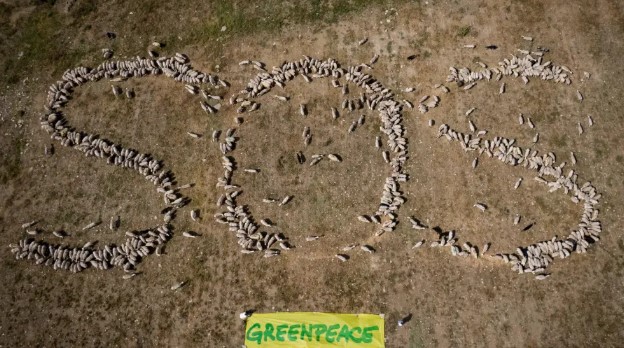In an unprecedented and symbolic action for World Environment Day, a herd of 800 sheep in Almudévar, Huesca, has sent an unmistakable SOS signal through the Spanish landscape. The action, orchestrated by Greenpeace, saw the animals dyed green to form a giant “SOS,” aiming not only to attract attention but also to highlight the urgent need for change in Spain’s agricultural and food system.
The poignant message from the sheep, manifested in the heart of Aragon’s nature, unveils a profound drama that extends far beyond rural areas, affecting society as a whole. It concerns biodiversity, climate, social justice, health, and ultimately, the future of Spain.
The Silent Demise of Rural Spain
Spain is experiencing an alarming loss of its rural fabric. Week after week, small farms and livestock operations are disappearing. They are being crushed by a prevailing economic model that prioritizes intensive agribusiness and the profits of multinational corporations over the food sovereignty of the people. The result is an extremely productive but deeply unsustainable food system built on shaky ground.
Greenpeace Report Reveals Shocking Figures
A recent Greenpeace report indicates that the Spanish agricultural and food system emits over 107 million tons of CO₂ equivalents annually. This figure catapults the sector to one of the main drivers of climate change in Spain, even surpassing transport or electricity generation. While other sectors are already undergoing transformation, the food sector appears to be stuck in the last century.
If this trend does not change, food could become the largest contributor to greenhouse gases globally by 2050. The consequences would be devastating: further acceleration of climate change, massive loss of biodiversity, nitrate contamination of aquifers, soil erosion, and the collapse of fisheries.
A Model That Consumes the Territory
The overexploitation of livestock and agriculture, the excessive use of fertilizers and pesticides, and intensive monocultures have put the health of Spain’s ecosystems at risk. Currently, every second pollinating insect in Spain is endangered. Without a reversal of this trend, by 2050, over 300 plant and 200 terrestrial arthropod species could be added to the list of threatened species.
The situation in the marine environment is no less precarious. Overfishing, particularly in the Mediterranean, has already reduced biodiversity by up to 3%. It is expected that up to 428 species could disappear from national fishing grounds if the extractive model is not reversed. Greenpeace advocates for a clear commitment to artisanal fishing and the effective protection of 30% of waters.
On land, water is also becoming scarcer. Nitrate levels in many aquifers frequently exceed legal limits, with serious implications for human health and drinking water quality. A model change could reduce this pollution by 57% by 2050, thereby also reducing pressure on water resources in an increasingly arid country.
Solutions Exist, But Political Action Is Lacking
Greenpeace presents five key measures in its “Sustainable Food Model” to counteract this development:
- Promotion of agroecological production.
- Promotion of the cultivation and consumption of local legumes.
- Reduction of industrial livestock farming, especially pigs.
- Prioritization of artisanal fishing.
- A consistent fight against food waste.
These measures, according to environmentalists, would not only reduce ecological pressure but also restore the dignity and economic viability of rural areas. Helena Moreno, head of agriculture at Greenpeace Spain, emphasizes: “People have the right to sustainable and healthy food, but the profit of a few companies takes precedence over the food sovereignty of the population. Food must be defended as a human right and not as a commodity that benefits a few pockets.”
The choice of the sheep herd for this action is no coincidence. It was a herd of extensive migratory sheep and the Churra tensina, a native breed of the northern sub-plateau, clearly endangered due to industrial livestock farming.
While we await courageous political decisions, 800 sheep in Almudévar have sent an unequivocal message: Without land, no future. Without a food transition, no ecological transition. Listening to what the land tells us and supporting shepherds committed to extensive livestock farming, as well as farmers who treat the soil as a common good, is not only a matter of justice but of common sense. Protecting rural areas means protecting our health, our environment, and our ability to feed ourselves and future generations well.




